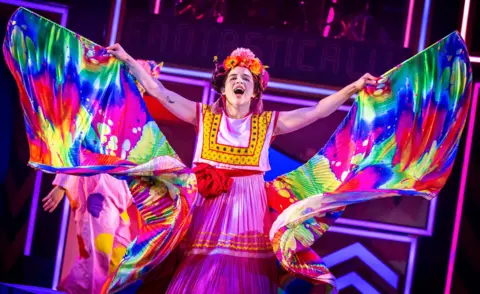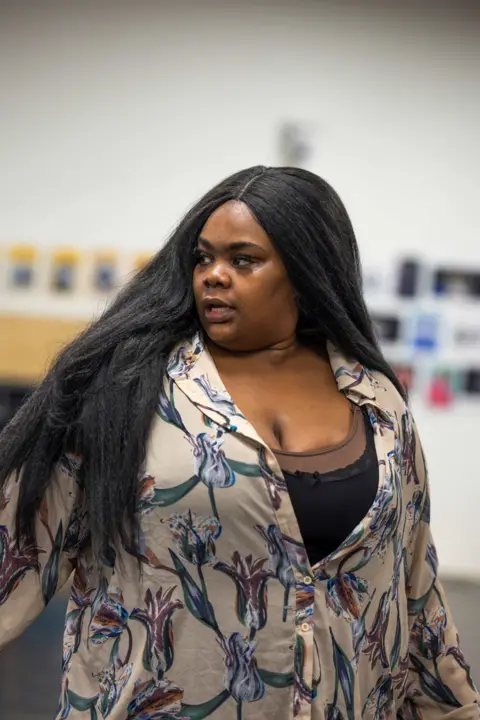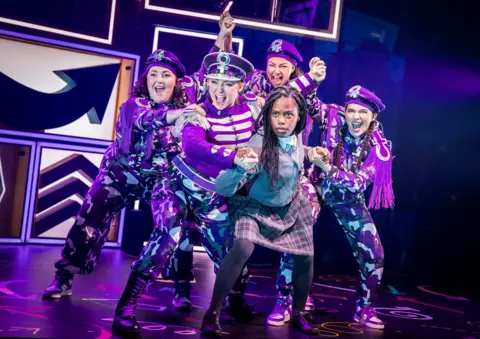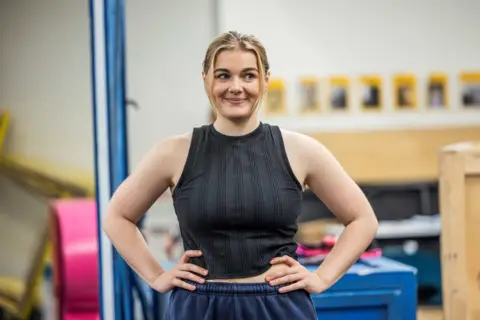
 Pamela Raith Photography
Pamela Raith PhotographyEmmeline Pankhurst. Rosa Parks. Marie Curie. Frida Kahlo. Jane Austen. Mary Seacole.
All famous women who have changed the course of history.
But how about these less-familiar names?
Gertrude Erdele. Sacagawea.
Alongside their more famous counterparts, they are being brought to life in the musical Fantastically Great Women Who Changed the World, as its latest reincarnation marches into London’s The Other Palace theatre later this month.
The women are lifted from the pages of the children’s book series of the same name by Kate Pankhurst (a distant relative of Emmeline), with their achievements celebrated against a backdrop of catchy pop tracks.
Analisa Lamola plays four parts including civil rights activist Rosa Parks, pioneering pilot Amelia Earhart and Mary Seacole, the Jamaican-born Crimean War nurse.
 Ellie Kurttz
Ellie Kurttz“This is one of those shows where you get to play around but at the same time, be educating people, allowing for women to just have… an empowering moment,” she says.
“The variety of different women that we have on the show… Amy Hodge (the director) does an incredible job of giving us the… room to make them real people but at the same time, allow them to also live in that realm of heroes, superheroes, these Marvel characters almost,” Lamola says.
Meg Hateley stars alongside her, and also plays several roles including Suffragettes leader Pankhurst. She says working on the show, which comes from the same team behind the hit musical Six, has been an education for the cast, too.
“Each day I come in, it’s like I’m learning more and more. I didn’t know Sacajawea. The only reference I had for her was actually The Night at the Museum film! (The Native American explorer is a character in the 2006 hit film).
“There’s quite a few that I wasn’t really aware of. And even the bigger names, I hadn’t really been taught about Emmeline Pankhurst and people like that growing up.
“I knew the name and I knew about votes for women, but I didn’t know many facts about her,” she explains.
Lamola concurs: “I didn’t know about Gertrude Ederle (the first woman to swim the English channel). That was shocking to me. I knew who she was. But I didn’t know some of the things about her life.”
 Pamela Raith Photography
Pamela Raith PhotographyPankhurst says it’s one of the big messages she would like audiences to walk away with: “To look a bit harder and delve into history a bit deeper and to give children (the knowledge about) all these women who did a really wide range of things, and they might see a little bit of themselves in.”
But with so many roles and a small tight-knit cast, taking on several different parts in one production was no mean feat for the actors.
“This is probably the first time I’m doing this many characters, and having to differentiate, especially when it comes to accents… I cover mid-America, the Caribbean, southern US… I’m loving it… it’s just changing the pace of how I work,” Lamola enthuses.
“I was just very excited about how much of a stretch that’s going to give me as an actress, just to be able to tap into these different people’s psyches.”
Hateley adds that “it’s fun but it can be overwhelming. To distinguish each character is a lot”.
“We had a brilliant accent coach come in and that’s really helped. Another character I play is called Agent Fifi and she’s French. So… to go from Emmeline Pankhurst, who’s northern, to Fifi, who’s got a flirtatious, coquettish side, it’s fantastic.”
 Ellie Kurtzz
Ellie KurtzzWith an all-female cast, there’s almost an entirely female creative team behind the scenes too.
“This is my first time being in a (rehearsal) room that is all female. Of course we’ve got men in our company but the immediate and direct family right now that in rehearsal spaces is just us women,” Lamola explains.
“I feel so safe. So safe to be around them. I feel so safe about my hormones. A lot of people don’t talk about this, but our voices are affected when you’re on your period. So, just to be able to say that and somebody understand that and offer some help… it feels like such a small thing, but it goes such a long way,” she adds.
Two powerhouse women are also behind the eclectic musical numbers, incorporating genres including pop, rap, ballads and soul.
Miranda Cooper is best known for co-writing hits for Girls Aloud, Sugababes and Kylie Minogue, while Jennifer Decilvio has penned tracks for the likes of Miley Cyrus, Hinds, Anne-Marie and Beth Ditto. Cooper also co-wrote the script.
Hateley says: “You’re getting to sing these epic pop songs. And not only that, it’s with the most brilliant messages. I play Pankhurst and her song Deeds Not Words, I I feel so powerful doing it. I hope that that means other people are going to feel the same hearing it as well.”
‘Engage with kids’
The musical, like the book series, is aimed at younger audiences.
Performing for a younger audience shouldn’t prove too challenging for Lamola.
“It’s easy for me because I do voiceovers for Hey Duggee (the CBeebies show). And having done panto in the past, you learn how to engage with kids.”
Hateley is also looking forward to connecting with young theatre goers.
“I love the idea of possibly being somebody’s first experience of theatre. And that can involve children but not in…. a patronising manner. They’re actually just getting all the information, a bit like how I grew up with Horrible Histories. It feels like a similar sort of tone.”
Pankhurst says it’s been a thrill to see her books come to life on stage.
“Every time I’ve been to see it I feel I’m sitting a bit taller in my chair, I can go out and take on the world and be a stronger powerful woman. And to think a younger audience are seeing that as well is really special.”
The show first debuted as a touring production in 2021 and was well received.
The Guardian’s Arifa Akbar described it as “a high voltage show with great charisma”.
She added: “Ordinarily, a production built on a simplistic ‘smash the patriarchy’ brand of empowerment would leave me cold but this is not that. It is certainly feel-good but surprisingly nuanced.”
Alice Saville, writing in The London Evening Standard, gave the show four stars.
“The dream team behind the show have managed to turn the commercialised business of heroine-worship into something that’s both nuanced and unapologetically joyful.
“It has all the energy of a girl band concert, mixed with just enough history to tempt young people to read up on its stars, once its final notes fade away.”
Women’s experiences
A report last year, the Women in Theatre Survey Update, suggested that only 6% of women working in theatre felt opportunities were increasing.
Based on the experiences of 155 women, 75% called for childcare support to help address gender inequality within the sector.
Lamola says there is still a way to go for women to achieve parity in the industry.
“I feel like women spend so much time trying to break into male spaces in a very masculine kind of way, where, you know, we end up having to act like them, and they only accept those that act like them.
“And that’s going to be the real truth about success in our industry, when you have everybody that’s different being able to lead a room without us having the quintessential tick boxes of what that person should look like.”
Fantastically Great Women Who Changed the World is at The Other Palace Theatre in London from 20 July to 8 September.



Be the first to comment